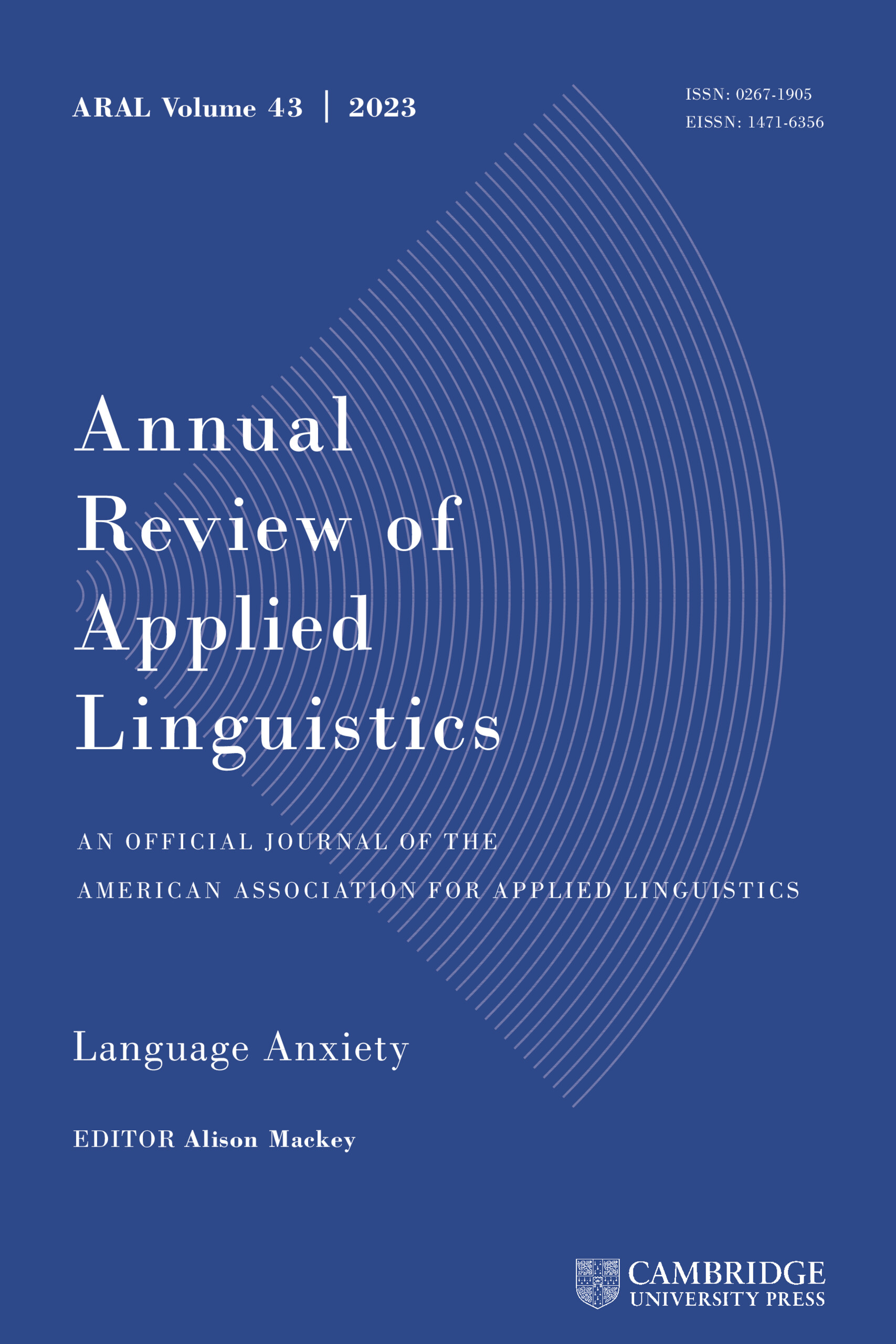Crossref Citations
This article has been cited by the following publications. This list is generated based on data provided by
Crossref.
Francis, Norbert
2004.
The components of bilingual proficiency.
International Journal of Bilingualism,
Vol. 8,
Issue. 2,
p.
167.
Francis, Norbert
2005.
Research Findings on Early First Language Attrition: Implications for the Discussion on Critical Periods in Language Acquisition.
Language Learning,
Vol. 55,
Issue. 3,
p.
491.
Mendonça, Patrícia Villa da Costa Ferreira
and
Fleith, Denise de Souza
2005.
Relação entre criatividade, inteligência e autoconceito em alunos monolíngues e bilíngües.
Psicologia Escolar e Educacional,
Vol. 9,
Issue. 1,
p.
59.
MEISEL, JÜRGEN M.
2007.
The weaker language in early child bilingualism: Acquiring a first language as a second language?.
Applied Psycholinguistics,
Vol. 28,
Issue. 3,
p.
495.
Leung, Yan-kit Ingrid
2007.
Third language acquisition: why it is interesting to generative linguists.
Second Language Research,
Vol. 23,
Issue. 1,
p.
95.
Redford, Melissa A.
and
Gildersleeve-Neumann, Christina E.
2009.
The Development of Distinct Speaking Styles in Preschool Children.
Journal of Speech, Language, and Hearing Research,
Vol. 52,
Issue. 6,
p.
1434.
YAN, STEPHANIE
and
NICOLADIS, ELENA
2009.
Finding le mot juste: Differences between bilingual and monolingual children's lexical access in comprehension and production*.
Bilingualism: Language and Cognition,
Vol. 12,
Issue. 03,
p.
323.
Heller, Monica
and
Pavlenko, Aneta
2009.
Handbook of Pragmatics.
p.
1.
Nicoladis, Elena
Rose, Alyssa
and
Foursha-Stevenson, Cassandra
2010.
Thinking for speaking and cross-linguistic transfer in preschool bilingual children.
International Journal of Bilingual Education and Bilingualism,
Vol. 13,
Issue. 3,
p.
345.
Blom, Elma
2010.
Effects of input on the early grammatical development of bilingual children.
International Journal of Bilingualism,
Vol. 14,
Issue. 4,
p.
422.
Chang-Smith, Meiyun
2010.
Developmental pathways for first language acquisition of Mandarin nominal expressions: Comparing monolingual with simultaneous Mandarin—English bilingual children.
International Journal of Bilingualism,
Vol. 14,
Issue. 1,
p.
11.
Gort, Mileidis
2012.
Code-Switching Patterns in the Writing-Related Talk of Young Emergent Bilinguals.
Journal of Literacy Research,
Vol. 44,
Issue. 1,
p.
45.
Chondrogianni, Vasiliki
2013.
Book Review: Norbert Francis, Bilingual competence and bilingual proficiency in child development.
First Language,
Vol. 33,
Issue. 6,
p.
654.
Rhys, Mirain
and
Thomas, Enlli Môn
2013.
Bilingual Welsh–English children's acquisition of vocabulary and reading: implications for bilingual education.
International Journal of Bilingual Education and Bilingualism,
Vol. 16,
Issue. 6,
p.
633.
Weissmann, Elke
2013.
Excluded from the institutional habitus: the joint student experience.
Journal of Further and Higher Education,
Vol. 37,
Issue. 2,
p.
261.
Costa, Albert
and
Sebastián-Gallés, Núria
2014.
How does the bilingual experience sculpt the brain?.
Nature Reviews Neuroscience,
Vol. 15,
Issue. 5,
p.
336.
Nibun, Yukari
and
Wigglesworth, Gillian
2014.
Early pragmatic differentiation in Japanese and German: a case study of a developing trilingual child in Australia.
International Journal of Multilingualism,
Vol. 11,
Issue. 1,
p.
76.
Besa, Lynn M.
2014.
Language Use in the University: A Clash of Policies.
Procedia - Social and Behavioral Sciences,
Vol. 134,
Issue. ,
p.
92.
PIRVULESCU, MIHAELA
PÉREZ-LEROUX, ANA-TERESA
ROBERGE, YVES
STRIK, NELLEKE
and
THOMAS, DANIELLE
2014.
Bilingual effects: Exploring object omission in pronominal languages.
Bilingualism: Language and Cognition,
Vol. 17,
Issue. 3,
p.
495.
Laurent, Angélique
Nicoladis, Elena
and
Marentette, Paula
2015.
The development of storytelling in two languages with words and gestures.
International Journal of Bilingualism,
Vol. 19,
Issue. 1,
p.
56.




